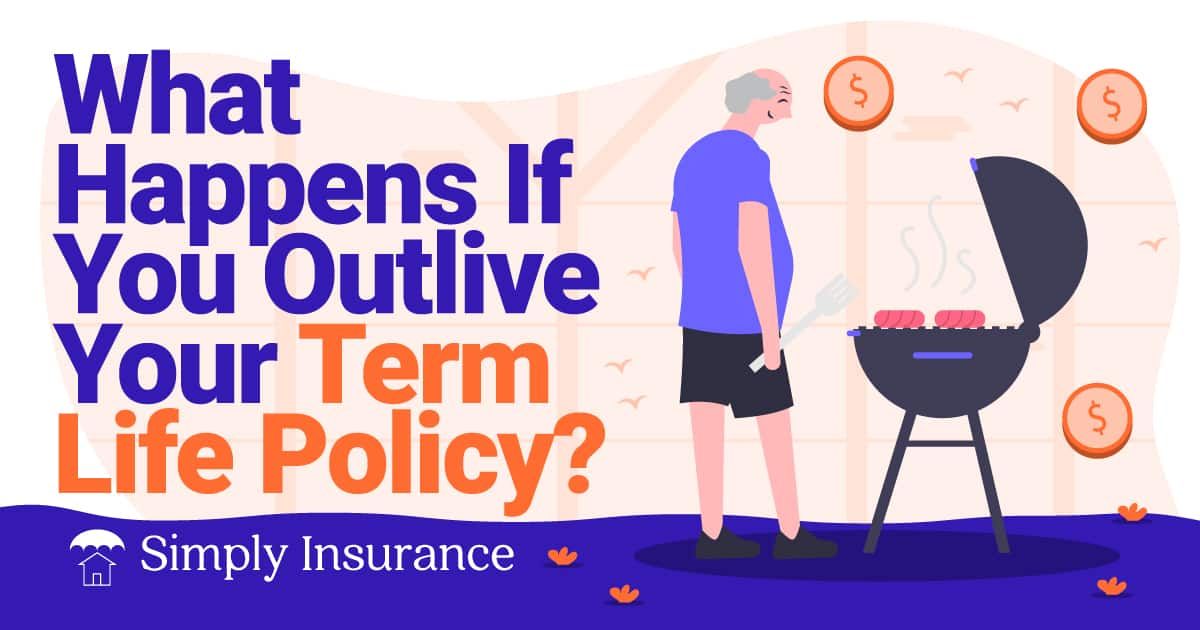If you have term life insurance, you might be wondering what happens if your policy expires before you die.
Your coverage ends, but what happens to all the premiums you paid over the years?
Do your beneficiaries still receive a payout?

Let’s take a closer look at what happens to term life insurance if you don't die before your policy expires and how to make sure your family still gets coverage for your end-of-life expenses.
What Happens To Term Life Insurance If You Don’t Die?
When you purchase a term life insurance policy, you may not die during the policy term. What happens if you outlive your term life insurance?
If you die after your policy expires, you forfeit the funds to the insurance company’s bucket so that other families and beneficiaries can get a payout when they need it.
You may outlive your policy, but someone else may pass away before they retire. That may leave their family in need of the death benefit to cover end-of-life expenses and sustain them after losing a source of income.
How Are the Premiums for My Life Insurance Policy Used?
To understand how your life insurance company uses your premiums, you must first ask, how does term life insurance payout?
When you die within the specified term of your policy, your beneficiaries get a payout based on your coverage amount. They can then use that money to pay for your end-of-life expenses.
However, your premiums don’t automatically go into a fund specifically for your beneficiaries. Insurance companies know that some people outlive their policies.
That’s why life insurance companies don't designate who pays what until it's time to payout. Your premiums go into a massive pool that the provider uses to cover the death benefits for people who do die unexpectedly and need that coverage.
What Happens When a Term Life Insurance Policy Matures?
Most people use life insurance as a safety net for if they die earlier than expected, but not everyone over a certain age can afford to pay for end-of-life costs out of pocket.
Many people put aside funds to cover those costs later, and term life insurance covers them when the possibility exists that they won’t have enough saved to cover those costs before a certain point.
If you want to continue your coverage after your policy matures, you’ll need to change your policy type. Instead of term life insurance, you can opt for whole life insurance, which will cover you indefinitely.
You can’t outlive it, and no matter when you die, your beneficiaries will receive a death benefit.
What if I Have a Return of Premium Life Insurance Policy?
A return of premium (ROP) life insurance policy has a rider saying that your insurance company returns all your premiums if you outlive your policy.
With an ROP term life policy, you don’t feel like you’ve wasted money after paying premiums for several years to forfeit it to a large pool.

It might sound ideal, but this type of policy comes with disadvantages, too. Before you decide to purchase an ROP policy, you should understand how it works and what it means to have an active policy.
Advantages of Return of Premium Policies
A return of premium policy works the same way a typical term life insurance policy would in that your beneficiaries receive a death benefit if you die within the term.
However, if your policy matures, the insurance provider returns your premiums. Because your returned premiums don’t count as income, you don’t pay taxes on them.
ROP policies function more like an extra savings account—you know that no matter what, the money still belongs to you.
These policies can build cash value, and you can take out loans with the money you invest if you don’t mind risking a smaller death benefit.
Disadvantages of Return of Premium Policies
While return of premium policies offer plenty of advantages, including the security of knowing you keep your investment, they also have their disadvantages.
These types of term life insurance policies vary between insurance providers.
ROP policies often have higher premiums than regular term life insurance policies, which may require you to budget differently than you would with a standard policy.
Additionally, if you cancel your policy before it matures, you get less money than if you allowed it to expire.
You may also save more money if, instead of investing in a return of premium policy, you save the difference in a separate account.
For example, you may pay over three times more per month for an ROP policy.
If you budget for an ROP policy but purchase a regular term life policy, you can put away the difference between those two policies to save for later.
LIFE INSURANCE WHERE YOU LIVE
Life insurance by state.
With a Life Insurance policy you can take care of your family the right way.
Should anything happen to you, you'll want to leave your loved ones a financial nest egg for their wellbeing.
Click on your state to find out more.
Should I Convert My Term Policy to Whole Life?
You may wonder when to cancel your term life insurance, especially if you plan to outlive your policy. However, instead of ending your policy or allowing it to mature, you can convert it to whole life insurance.
With whole life insurance, you keep your coverage as you age, and your beneficiaries receive the death benefit no matter when you die.
You can convert most term life insurance policies, though it’s important to consider how that option affects you.
Whole life policies are usually more expensive than term life insurance, but all life insurance rates increase based on your age. If you've outlived your term life insurance policy at age 85, whole life insurance will cost you more.
At the same time, whole life insurance will protect your family and offer a payout no matter when you pass away. For some people, this security makes higher payments worth the investment.
If you want to convert your policy from term life to whole life insurance, consider doing it sooner rather than later.
Taking Action
Although your term life insurance policy will eventually mature, you have options for keeping your coverage and unfortunately some of us won't outlive our life insurance policy.
From return of premium policies to converting your policy to whole life, you don’t have to wonder what happens to your term life insurance if you don’t die.
Don’t waste any time getting covered and click here to get started today. You can also use our no-risk quoter form above.
